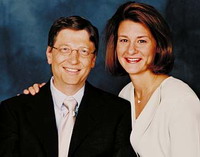Bill and Melinda Gates to annihilate malaria worldwide
Bill and Melinda Gates took the risky step of seeking to eradicate malaria worldwide instead of just keeping it under control.

A goal of anything short of eradication would be unethical and a bad business decision, despite unsuccessful efforts to stamp out the disease in the 1950s and 1960s, Melinda Gates said.
"It's a long-term goal; it won't come soon," she said, "but to aspire to anything less is just far too timid a goal for the age we're in. It's a waste of the world's talent and it's a waste of the world's intelligence, and it's wrong and unfair to the people who are suffering from this disease."
She said the world was not ready for a long fight against malaria 50 years ago, and when drugs and pesticides started failing, enthusiasm faded and funding almost disappeared. Malaria was eliminated from the United States and other developed countries at that time.
She is co-chairwoman of the Bill & Melinda Gates Foundation, which has committed $860 million (605.63 million EUR) to malaria programs and another $650 million (457.75 million EUR) to support the Global Fund to Fight AIDS, Tuberculosis and Malaria.
Bill Gates promised the foundation's enthusiasm for the cause would never lag. He said many others would contribute money and commitment as long as those attending the organization's first malaria forum keep showing the world they can achieve their goals.
"If you show the world that we can end this disease, you will unleash the energy and the caring the commitment we need to meet that goal," he said. "We're not done and we will not stop working until malaria is eradicated."
Malaria kills more than a million people each year, most of them children. Deaths doubled in Africa over the past 20 years as malaria grew resistant to existing drugs and insecticides. New efforts to control the spread of the disease and develop new medicine and vaccines are starting to show results, according to a UNICEF report issued Tuesday.
Millions of insecticide-treated bed nets are being distributed throughout sub-Saharan Africa. The newest treatment for the disease is reaching community health clinics in some countries. Four new vaccines are being prepared for large scale testing on humans as early as 2008.
After the Gates' presentation, conference participants said eradication should be possible as long as people and groups like the Gates Foundation continue to provide support.
"Funding for malaria is gaining momentum. Some years back you couldn't even get money for research. If that momentum grows over time, and people get the money to do more work, we will transform control to eradication," said Seth Owusu-Agyei, an epidemiologist with the Kintampo Health Research Centre in Kintampo, Ghana.
Owusu-Agyei led a team that recently completed a successful small trial of a new malaria vaccine for children developed by GlaxoSmithKline. Study results were released Wednesday in a paper published online in The Lancet.
The vaccine was found to be safe for infants and 35 percent effective in preventing new infections over a six-month period in infants. The same vaccine was found to be 45 percent effective among children age one to four.
Cooperation among those fighting the disease and developing vaccines, medications and insect control is key to achieving eradication, said Christian Loucq, director of the Malaria Vaccine Initiative,.
"The big risk is if you don't reach (eradication) soon, fatigue will come," Loucq said.
He and other emphasized the need for more money and coordination of efforts. He said the $107 million (75.35 million EUR) cost of a single one large-scale trial of a new vaccine, or phase three trial, shows the need for planning by organizations and governments.
Margaret Chan, director general of the World Health Organization, urged scientists and policy makers not be territorial in their work or waste time debating whether eradication is possible because, "as we are talking here, children are dying."
The World Health Organization pledges to do whatever it can to bring about an end to malaria, Chan said.
"We have to make it work in the interest of humanity," she said. "I dare you to come along with us."
Subscribe to Pravda.Ru Telegram channel, Facebook, RSS!


